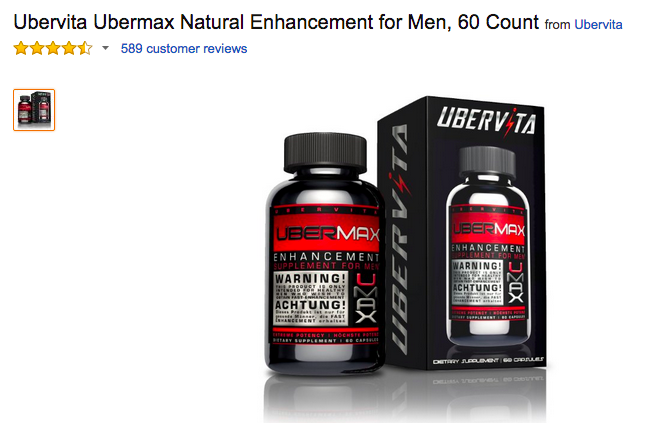If you remember the post from earlier this year in March, The ‘rampant fraud’ of Amazon sellers exposed – and is an Amazon employee one of the culprits?, we have some more juicy data to share with you.
Before I even heard about Ubervita and its suspicious business practices, I had noticed a disturbing trend in its reviews on Amazon.
I was browsing the top Amazon sellers of “Natural Testosterone Booster” and Ubervita’s Ubermax caught my eye. I had never heard this outside Amazon, yet it shows up as one of the highest recommended products with an average rating of 4.6 stars after 580 reviews.
I wanted to see how they managed to get such a high rating, so I decided to take a closer look at their 58 pages of reviews. I figured that I’d see some low-quality and suspicious reviews, but I never expected it to be as bad as this.
After examining the "Most Helpful Customer Reviews" section, some serious red flags immediately came to light. The top eight reviews are listed in this section, and all show a rating of 5 out of 5 stars. The first suspicion raised here is that seven of them were written in a two-day period of August 18 and 19.
Just reading the reviews raised even more suspicion. The longest of these reviews was only 197 words, and one of the reviewers admitted that she was not even the one taking the product – her husband was – and one of the reviews reads like a textbook sales pitch.
Drilling down further, I checked the profile of each user behind the top reviews. Seven out of eight of these users had given 5/5 stars to other Ubervita products already. I was beginning to see a trend.
At this point, I decided that I was going to have to scan through the next 572 reviews, and this is when I noticed some further disturbing patterns:
- At least eight reviewers admitted flat-out that they did not take the product. This makes us wonder if other reviewers hadn’t taken the product either and just didn’t mention it.
- Multiple reviewers admitted that they had just started taking it. Some of them even stated that they didn’t notice anything yet but gave it five stars anyway.
- Several reviewers blatantly reviewed the wrong product, again raising more suspicion as to whether or not the majority of reviewers actually took the product in question.
The vast majority of the reviews were extremely thin, and lacked any actual details about the product or its effects. Most of them were just one or two words, such as “great product”.
I even noticed that one reviewer uploaded a before-after body image that was not their own. I discovered this by doing a reverse image search on the picture, finding that it was originally posted to Reddit.com. When I asked the original poster if he had used and reviewed Ubermax, he said that he has never heard of Ubermax and did not authorise the use of his before-after photo in the review.
Mining some data and graphing review trends raised even more suspicion. Although the review dates range from 7/19 to 10/5 (the date that I did the investigation), I noticed that 35% of reviews had been written in just a three-day period in the middle of August, or an average of 68 reviews per day.
Furthermore, 31% of reviews appeared in the first week, or an average of 26 reviews per day. Outside of those ten days, we see an average of three reviews written per day. If the reviews were naturally occurring, you’d expect to see a more even distribution of review dates.
Finally, I wanted to check out the profiles of the first 30 users to post reviews for this product. Again, my findings raise even more suspicion as to the legitimacy of the reviews.
27 of the first 30 reviewers had reviewed multiple Ubervita products, while 14 of them had reviewed nothing but Ubervita products. It was now becoming obvious that Ubervita is leveraging the same group of users to inflate their ratings.
So what explains these extremely suspicious findings?
After first summarising my findings on my own site, I then posted my study on Reddit, and the top comment essentially solved the mystery:
I purchased this product, Literally within a few days they sent me multiple emails saying if I just reviewed their other products, and sent them link to the review they would send me that product for free…They did indeed send me a free product for every single review i wrote…They keep sending me emails for free products for reviews…
The story that the data tells seems to corroborate what this user had experienced and what Information Age’s previous article exposed. Ubervita is clearly using some extremely aggressive techniques for boosting their ratings and pushing their products into the highly profitable top seller’s list.
I’m personally surprised that this tactic actually works on a site as large-scale as Amazon. It’s easy for anyone to see that most of these reviewers are not at all qualified to be rating this product, especially the ones who admit that they haven’t actually used the product.
This information should act as a wake-up call to both consumers and Amazon itself. Consumers need to be aware that reviews are easily influenced by the sellers, and that it may not be a good idea to base buying decisions directly off a star rating.
Furthermore, Amazon needs to understand its potential loss of trust with users becoming more skeptical of its lackluster review system.
Tommy Noonan is owner of SupplementReviews.com, an ‘unbiased review site dedicated to bringing honesty into an industry known for scams and out of control marketing hype’










